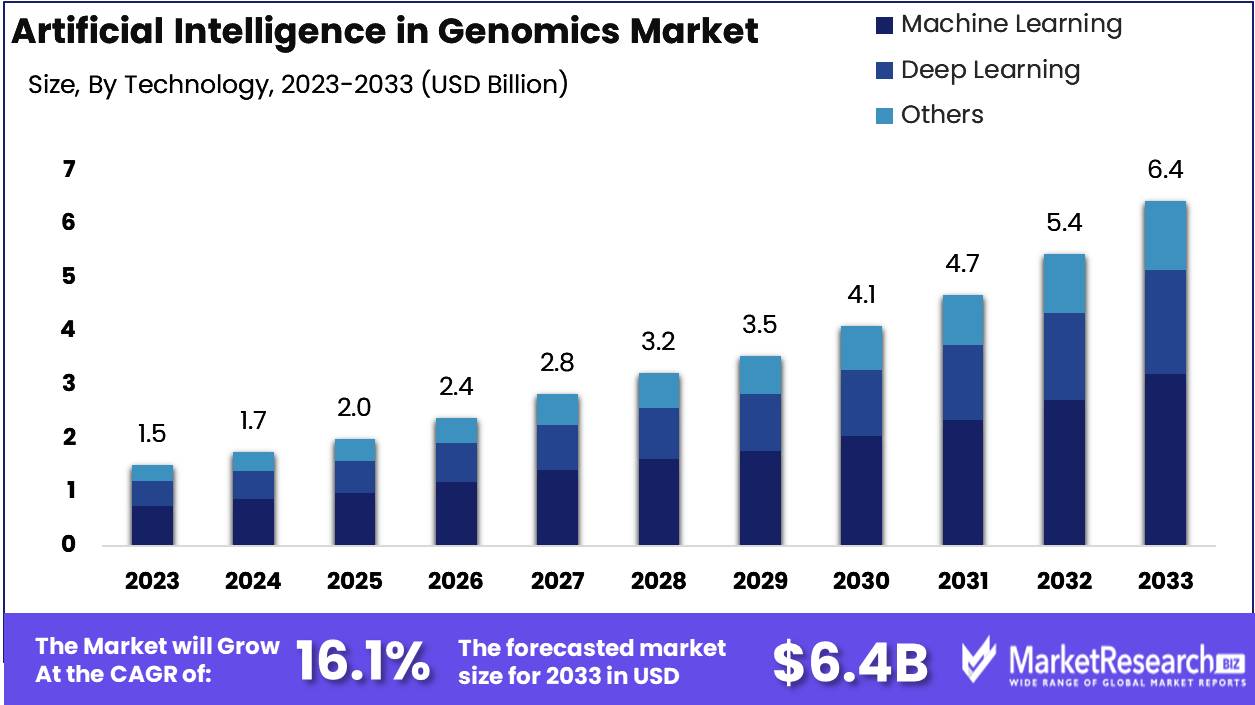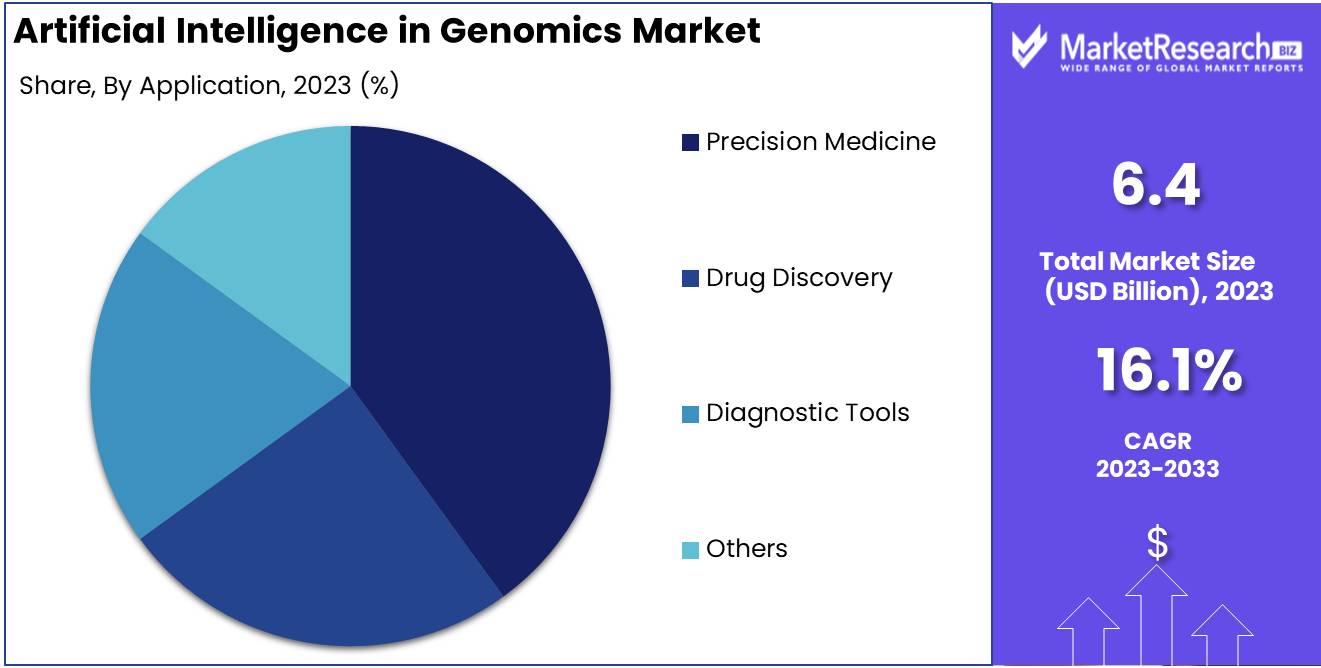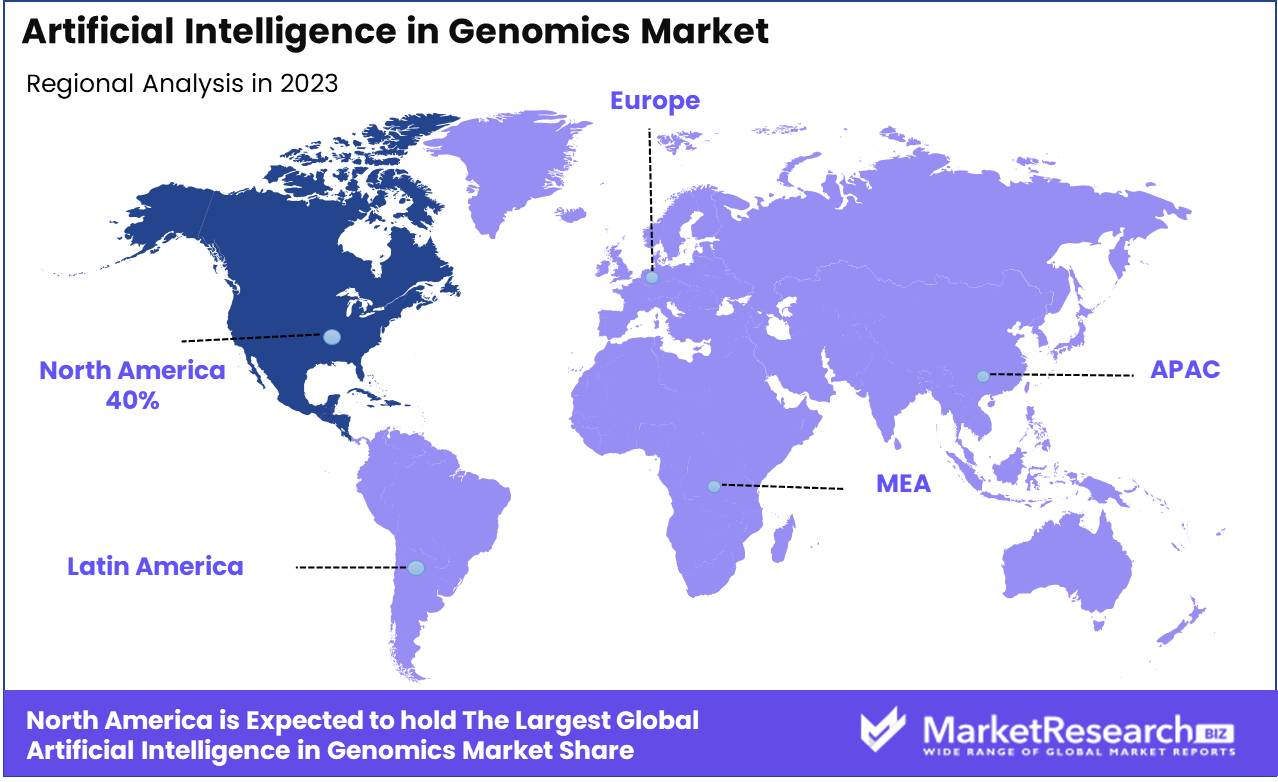
Artificial Intelligence In Genomics Market By Technology (Machine Learning, Deep Learning, Others), By Application (Precision Medicine, Drug Discovery, Diagnostic Tools, Others), By End-User (Biopharmaceutical Companies, Research Centers, Academic Institutions), By Region and Companies - Industry Segment Outlook, Market Assessment, Competition Scenario, Trends and Forecast 2024-2033
-
50388
-
Aug 2024
-
321
-
-
This report was compiled by Vishwa Gaul Vishwa is an experienced market research and consulting professional with over 8 years of expertise in the ICT industry, contributing to over 700 reports across telecommunications, software, hardware, and digital solutions. Correspondence Team Lead- ICT Linkedin | Detailed Market research Methodology Our methodology involves a mix of primary research, including interviews with leading mental health experts, and secondary research from reputable medical journals and databases. View Detailed Methodology Page
-
Quick Navigation
Report Overview
The Global Artificial Intelligence In Genomics Market was valued at USD 1.5 Bn in 2023. It is expected to reach USD 6.4 Bn by 2033, with a CAGR of 16.1% during the forecast period from 2024 to 2033.
The Artificial Intelligence in Genomics Market involves the application of advanced AI technologies, including machine learning and deep learning, to the analysis and interpretation of complex genomic data. This market is revolutionizing the field of genomics by enabling more accurate and efficient identification of genetic mutations, disease risks, and personalized treatment options. With the rapid growth in genomic data and the increasing need for precision medicine, AI-driven solutions are becoming integral to advancing research, diagnostics, and therapeutics in genomics, positioning this market for significant expansion and innovation in the coming years.

The integration of artificial intelligence in genomics is fundamentally reshaping the landscape of genetic research and healthcare. AI's ability to process and analyze vast quantities of genomic data with unprecedented speed and accuracy is driving breakthroughs in disease understanding and treatment development. A prime example is the AI-driven metagenomic analysis that identified diverse vertebrate hosts and Plasmodium parasites in 1,142 Anopheles gambiae mosquito specimens. This demonstrates the critical role AI plays in advancing genomic research, particularly in understanding and combating vector-borne diseases, which remain a significant global health challenge.
Looking ahead, the role of AI in genomics is expected to be a focal point at the 2024 PQG Conference at Harvard. The conference will spotlight the integration of cutting-edge AI technologies such as transformers, large language models, and protein structure models in genomics. These advancements underscore the potential of AI to revolutionize healthcare outcomes by enabling more precise and personalized medical interventions. The growing incorporation of AI in genomics is not just enhancing research capabilities but also accelerating the translation of genomic insights into practical healthcare solutions.
As the Artificial Intelligence in Genomics Market continues to evolve, it is poised to drive significant innovations in personalized medicine, drug discovery services, and public health. The ability to leverage AI for the rapid analysis of complex genomic data will be pivotal in addressing some of the most pressing health issues of our time, making AI an indispensable tool in the future of genomic research and healthcare delivery.
Key Takeaways
- Market Value: The Global Artificial Intelligence In Genomics Market was valued at USD 1.5 Bn in 2023. It is expected to reach USD 6.4 Bn by 2033, with a CAGR of 16.1% during the forecast period from 2024 to 2033.
- By Technology: Machine Learning dominates with 50%, crucial for analyzing genetic data and predicting outcomes.
- By Application: Precision Medicine represents 40%, utilizing AI to tailor treatments based on genetic information.
- By End-User: Biopharmaceutical Companies make up 45%, leveraging AI for drug development and personalized therapies.
- Regional Dominance: North America holds a 42% market share, driven by strong investments in AI and genomics.
- Growth Opportunity: Expanding AI applications in gene editing and personalized medicine can significantly enhance the genomics market.
Driving factors
Rising Demand for Personalized and Precision Medicine
The growing emphasis on personalized and precision medicine is a significant driver for the adoption of artificial intelligence (AI) in genomics. As healthcare moves toward tailored treatments based on an individual's genetic makeup, the demand for advanced genomic analysis has surged. AI plays a crucial role in processing vast amounts of genetic data quickly and accurately, enabling the identification of genetic variants linked to diseases.
This capability is essential for developing targeted therapies, improving patient outcomes, and reducing the trial-and-error approach in treatment selection. The push for personalized medicine accelerates the need for AI in genomics, fostering market growth as healthcare providers and researchers increasingly rely on AI-driven insights for patient-specific treatment plans.
Advancements in Genome Sequencing Technologies
Advancements in genome sequencing technologies have drastically reduced the cost and time required for sequencing, leading to an exponential increase in the volume of genomic data generated. However, the complexity and sheer volume of this data present significant challenges for traditional data analysis methods. AI has emerged as a vital tool in overcoming these challenges, offering sophisticated algorithms that can analyze and interpret genomic data with greater accuracy and efficiency.
By automating the identification of patterns and anomalies within the genetic code, AI enhances the utility of genome sequencing, making it more accessible and actionable. This synergy between cutting-edge sequencing technologies and AI is a driving force behind the expanding AI in genomics market, as it enables researchers and clinicians to unlock deeper insights into genetic information.
Growth in AI-Driven Data Analysis Tools
The continuous evolution of AI-driven data analysis tools is pivotal to the growth of the AI in genomics market. These tools are designed to handle the complexity of genomic data, providing advanced analytical capabilities that go beyond what traditional methods can achieve. AI-driven tools can process large datasets, identify correlations, predict outcomes, and even generate new hypotheses, making them indispensable in both research and clinical settings.
The integration of machine learning and deep learning algorithms into genomic data analysis enhances the accuracy of predictions related to disease susceptibility, treatment response, and drug development. As these tools become more sophisticated, they not only accelerate the pace of genomic research but also broaden the scope of AI applications in genomics, driving market expansion.
Restraining Factors
High Computational and Infrastructure Costs
The integration of artificial intelligence (AI) in genomics requires substantial computational power and advanced infrastructure, which can be prohibitively expensive for many organizations. High-performance computing systems, data storage solutions, and specialized AI software are necessary to process and analyze the vast amounts of genomic data. These costs present a significant barrier to entry, particularly for smaller research institutions and companies with limited budgets.
The high computational and infrastructure expenses can slow the adoption of AI in genomics, restricting its use to well-funded organizations and limiting the overall growth of the market. Additionally, ongoing costs for maintaining and upgrading these systems can strain resources, making it challenging to sustain long-term AI-driven genomic research and clinical applications.
Ethical Concerns Related to Genetic Data Use
Ethical concerns surrounding the use of genetic data in AI-driven genomics pose a significant challenge to the market's growth. The collection, storage, and analysis of genetic information raise critical issues related to privacy, consent, and the potential misuse of sensitive data. There is growing public and regulatory scrutiny over how genetic data is handled, with fears that it could be used for discriminatory purposes or accessed by unauthorized parties. These ethical considerations can lead to stricter regulations and compliance requirements, making it more difficult for companies to operate in this space.
Concerns about data privacy and security can erode public trust, leading to reluctance among individuals to share their genetic information for AI-driven research and applications. This hesitation can reduce the availability of data necessary for AI algorithms to function effectively, ultimately slowing the advancement of AI in genomics and hindering market expansion.
By Technology Analysis
In 2023, Machine Learning held a dominant market position in the By Technology segment of the Artificial Intelligence in Genomics Market, capturing more than a 50% share.
Machine Learning (ML) has become a cornerstone technology in genomics, enabling the analysis of vast and complex datasets generated by genomic sequencing. ML algorithms excel at identifying patterns and correlations within genomic data that are critical for understanding genetic variations and their associations with diseases. The dominance of Machine Learning in this segment is driven by its applications in predictive modeling, gene expression analysis, and personalized medicine. These capabilities are increasingly being utilized by biotech firms and research institutions to accelerate the discovery of novel biomarkers and therapeutic targets, further solidifying ML's leading position in the AI-driven genomics market.
Deep Learning, while also integral to genomics, plays a more specialized role, particularly in image-based genomic studies and complex data interpretation tasks. Other technologies, including natural language processing (NLP) and AI-driven data mining, contribute to the broader AI genomics landscape but are less central compared to ML, which remains the primary driver of innovation and growth in this sector.
By Application Analysis
In 2023, Precision Medicine held a dominant market position in the By Application segment of the Artificial Intelligence in Genomics Market, capturing more than a 40% share.
Precision Medicine has emerged as the leading application of AI in genomics, focusing on the customization of healthcare tailored to individual genetic profiles. AI technologies, particularly those involving Machine Learning, are pivotal in analyzing genomic data to identify specific genetic mutations and variations that influence a person's response to drugs or susceptibility to certain diseases. The rise of Precision Medicine is fueled by the growing demand for personalized treatment plans that optimize therapeutic efficacy and minimize adverse effects, making it a primary focus for healthcare providers and researchers alike.
While Precision Medicine leads the market, applications such as Drug Discovery and Diagnostic Tools are also significant. Drug Discovery leverages AI to identify potential drug candidates by analyzing genomic data, speeding up the process of bringing new therapies to market. Diagnostic Tools benefit from AI's ability to interpret complex genomic data for early and accurate disease detection, particularly in oncology and rare genetic disorders. However, these applications, though critical, do not match the broad impact of Precision Medicine in transforming genomic-driven healthcare.
By End-User Analysis
In 2023, Biopharmaceutical Companies held a dominant market position in the By End-User segment of the Artificial Intelligence in Genomics Market, capturing more than a 45% share.
Biopharmaceutical Companies are at the forefront of integrating AI into genomics, primarily to enhance drug discovery, development, and personalized treatment strategies. These companies invest heavily in AI-driven genomic research to identify genetic targets for new drugs and to develop therapies that are more effective and tailored to individual patients' genetic make-up. The substantial financial resources and research capabilities of biopharmaceutical firms enable them to lead in this market, as they seek to innovate and maintain competitive advantages in the fast-evolving field of genomics.
Research Centers and Academic Institutions are also key players in the AI genomics market. Research Centers focus on advancing scientific knowledge through the application of AI in genomic studies, often in collaboration with biopharmaceutical companies. Academic Institutions contribute to the market through cutting-edge research and the development of new AI methodologies for genomic data analysis. However, their market influence is comparatively smaller, as they often rely on partnerships with industry leaders to commercialize their innovations.

Key Market Segments
By Technology
- Machine Learning
- Deep Learning
- Others
By Application
- Precision Medicine
- Drug Discovery
- Diagnostic Tools
- Others
By End-User
- Biopharmaceutical Companies
- Research Centers
- Academic Institutions
Growth Opportunity
Development of AI Tools for Genome-Wide Association Studies (GWAS)
The ongoing development of AI tools for genome-wide association studies (GWAS) presents significant opportunities for the genomics market in 2024. GWAS are essential for identifying genetic variants associated with specific diseases and traits, and AI can dramatically enhance the accuracy and speed of these studies.
By integrating AI algorithms, researchers can sift through vast genomic datasets more efficiently, uncovering previously hidden correlations and accelerating the discovery of genetic markers. This advancement is poised to enhance predictive power in disease risk assessment and personalized medicine, making AI an indispensable tool in genomics.
Expansion in Rare Disease Research and Drug Development
The expansion of AI applications in rare disease research and drug development is another key growth opportunity for the genomics market. Rare diseases, which often lack effective treatments due to the complexity of their genetic underpinnings, are now being targeted with AI-driven approaches. AI can analyze rare genetic variants and predict their impact on disease progression, offering new insights into potential therapeutic targets.
This capability is crucial for pharmaceutical companies seeking to develop drugs for these underserved conditions. The ability of AI to streamline the drug discovery process, particularly in rare diseases, is expected to drive significant advancements in treatment options, opening new avenues for market growth.
Latest Trends
In 2024, one of the most transformative trends in the Artificial Intelligence (AI) in Genomics Market is the growing use of AI in gene editing and synthetic biology applications. AI is increasingly being leveraged to enhance the precision and efficiency of gene-editing technologies like CRISPR. By predicting off-target effects and optimizing editing strategies, AI is enabling more accurate modifications of genetic material.
In synthetic biology, AI is being used to design and simulate new biological systems, paving the way for innovations in areas such as drug development, agricultural biotechnology, and industrial biomanufacturing. This trend is expected to revolutionize genetic engineering, pushing the boundaries of what can be achieved in genomics.
Integration with Cloud-Based Genomics Platforms
Another key trend for 2024 is the integration of AI with cloud-based genomics platforms, which is significantly enhancing data accessibility and collaboration in the field. Cloud computing allows researchers to store and analyze vast amounts of genomic data without the need for expensive local infrastructure.
AI-powered tools on these platforms can perform complex analyses in real time, facilitating faster insights and more effective collaboration across research teams globally. This trend is particularly important as the volume of genomic data continues to grow, making cloud-based solutions essential for managing and utilizing this information efficiently.
Regional Analysis
North America is the dominating region in the Artificial Intelligence in Genomics Market, holding a substantial 42% share.
In North America, the AI in Genomics market is experiencing significant growth, driven by advanced healthcare infrastructure, substantial investments in AI technologies, and strong government support for research and development in genomics. The United States, in particular, leads the region with numerous AI-driven genomics initiatives, supported by both public and private sectors. The region's dominance is further reinforced by the presence of key industry players and academic institutions specializing in genomics and AI research, contributing to its 42% market share.
Europe is another prominent region in the Artificial Intelligence in Genomics Market, with countries like the United Kingdom, Germany, and France at the forefront. The region benefits from strong collaborations between research institutions and AI companies, as well as a robust regulatory framework supporting AI integration in genomics. European governments have also been proactive in funding AI and genomics research, enhancing the region’s market position. The adoption of AI in personalized medicine and the growing focus on precision healthcare are driving market growth in Europe.
The Asia Pacific region is witnessing rapid growth in the AI in Genomics market, fueled by increasing investments in healthcare technology and the growing prevalence of genomics research. Countries like China, Japan, and South Korea are leading the charge, with significant advancements in AI applications in genomics. The region's large population base and the rising demand for personalized medicine are key factors contributing to market expansion.

Key Regions and Countries
North America
- US
- Canada
- Mexico
Western Europe
- Germany
- France
- The UK
- Spain
- Italy
- Portugal
- Ireland
- Austria
- Switzerland
- Benelux
- Nordic
- Rest of Western Europe
Eastern Europe
- Russia
- Poland
- The Czech Republic
- Greece
- Rest of Eastern Europe
APAC
- China
- Japan
- South Korea
- India
- Australia & New Zealand
- Indonesia
- Malaysia
- Philippines
- Singapore
- Thailand
- Vietnam
- Rest of APAC
Latin America
- Brazil
- Colombia
- Chile
- Argentina
- Costa Rica
- Rest of Latin America
Middle East & Africa
- Algeria
- Egypt
- Israel
- Kuwait
- Nigeria
- Saudi Arabia
- South Africa
- Turkey
- United Arab Emirates
- Rest of MEA
Key Players Analysis
The global Artificial Intelligence in Genomics Market in 2024 is significantly influenced by major players such as NVIDIA Corporation, IBM Corporation, Microsoft Corporation, Deep Genomics, Fabric Genomics Inc., BenevolentAI, Verge Genomics, F. Hoffmann-La Roche Ltd, Thermo Fisher Scientific Inc., and WuXi NextCODE.
NVIDIA Corporation and IBM Corporation lead with their powerful AI and computational technologies, which are essential for processing and analyzing genomic data. NVIDIA’s hardware accelerates machine learning tasks, while IBM’s AI platforms enhance genomic research and personalized medicine approaches.
Microsoft Corporation’s AI tools support genomic analysis through cloud-based solutions and advanced data integration. Deep Genomics and Fabric Genomics Inc. are prominent for their specialized AI algorithms that drive drug discovery and genetic research.
BenevolentAI and Verge Genomics offer innovative AI-driven approaches to genomics, focusing on drug development and disease understanding. F. Hoffmann-La Roche Ltd and Thermo Fisher Scientific Inc. leverage AI to advance genomic research and clinical applications, contributing to personalized medicine and precision diagnostics.
Market Key Players
- NVIDIA Corporation
- IBM Corporation
- Microsoft Corporation
- Deep Genomics
- Fabric Genomics Inc.
- BenevolentAI
- Verge Genomics
- F. Hoffmann-La Roche Ltd
- Thermo Fisher Scientific Inc.
- WuXi NextCODE
Recent Development
- In May 2024, Thermo Fisher Scientific Inc. secured a $50 million partnership with a leading research institute to develop AI-driven tools for gene editing. This collaboration is expected to enhance precision in gene therapy research.
- In January 2024, NVIDIA Corporation launched a new AI-powered platform designed to accelerate genomic sequencing. This platform is expected to improve processing speeds by 40%, making it a crucial tool for advanced research in personalized medicine.
Report Scope
Report Features Description Market Value (2023) USD 1.5 Bn Forecast Revenue (2033) USD 6.4 Bn CAGR (2024-2033) 16.1% Base Year for Estimation 2023 Historic Period 2018-2023 Forecast Period 2024-2033 Report Coverage Revenue Forecast, Market Dynamics, Competitive Landscape, Recent Developments Segments Covered By Technology (Machine Learning, Deep Learning, Others), By Application (Precision Medicine, Drug Discovery, Diagnostic Tools, Others), By End-User (Biopharmaceutical Companies, Research Centers, Academic Institutions) Regional Analysis North America - The US, Canada, & Mexico; Western Europe - Germany, France, The UK, Spain, Italy, Portugal, Ireland, Austria, Switzerland, Benelux, Nordic, & Rest of Western Europe; Eastern Europe - Russia, Poland, The Czech Republic, Greece, & Rest of Eastern Europe; APAC - China, Japan, South Korea, India, Australia & New Zealand, Indonesia, Malaysia, Philippines, Singapore, Thailand, Vietnam, & Rest of APAC; Latin America - Brazil, Colombia, Chile, Argentina, Costa Rica, & Rest of Latin America; Middle East & Africa - Algeria, Egypt, Israel, Kuwait, Nigeria, Saudi Arabia, South Africa, Turkey, United Arab Emirates, & Rest of MEA Competitive Landscape NVIDIA Corporation, IBM Corporation, Microsoft Corporation, Deep Genomics, Fabric Genomics Inc., BenevolentAI, Verge Genomics, F. Hoffmann-La Roche Ltd, Thermo Fisher Scientific Inc., WuXi NextCODE Customization Scope Customization for segments, region/country-level will be provided. Moreover, additional customization can be done based on the requirements. Purchase Options We have three licenses to opt for: Single User License, Multi-User License (Up to 5 Users), Corporate Use License (Unlimited User and Printable PDF) -
-
- NVIDIA Corporation
- IBM Corporation
- Microsoft Corporation
- Deep Genomics
- Fabric Genomics Inc.
- BenevolentAI
- Verge Genomics
- F. Hoffmann-La Roche Ltd
- Thermo Fisher Scientific Inc.
- WuXi NextCODE




